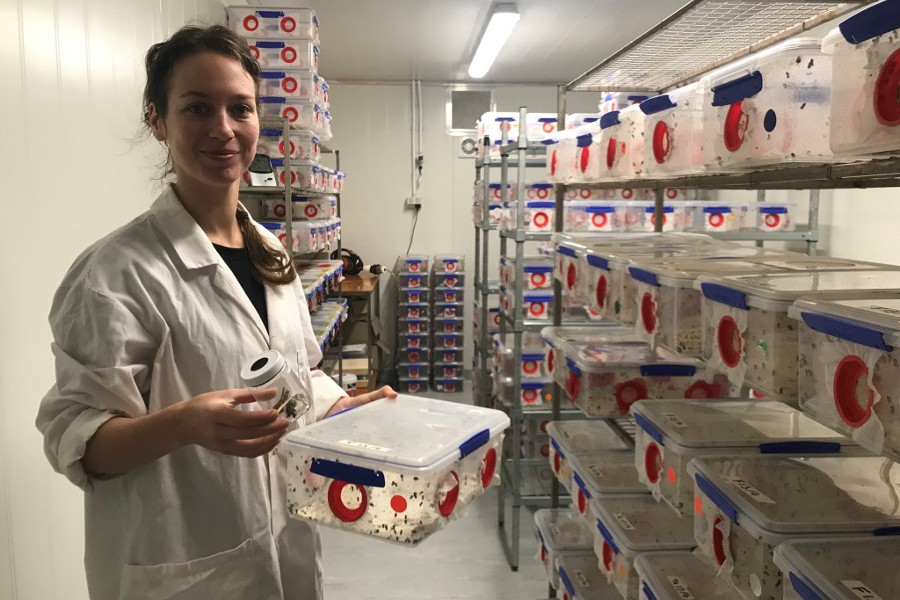We use cookies to give you a better experience on our website. Learn more about how we use cookies and how you can select your preferences.
Bugs For Bugs – creating biological alternatives to chemical pesticides

Bugs For Bugs researches the mass production of bio-control agents (bugs that eat other bugs).
Without the R&DTI, we almost certainly would not be where we are today.
Company profile
Company: Bugs For Bugs Pty Ltd
Sector: Agriculture
Location: Toowoomba, Queensland
Profile: Bugs For Bugs is a leading developer of non-toxic alternatives to chemical pesticides.
Why R&D is needed
For many years, the agriculture, forestry and fishery industries have relied on pesticides to control pests and improve yields. However, as evidence mounts linking pesticides with negative impacts on the environment and human health, scientists are looking toward more sustainable pest management solutions. One such solution is integrated pest management (IPM).
Bugs For Bugs is a Queensland-based company that has specialised in IPM for over 45 years. With the aim of helping Australian growers reduce their dependence on chemical pesticides, they are one of Australia’s leading suppliers of non-toxic alternatives.
The company’s product range includes a variety of bio-control agents in the form of insects that are natural enemies to pests. They are either native or naturalised and include ladybird beetles, tiny parasitic wasps, predatory mites, and many more. In Australia, the company is one of four that is mass rearing beneficial insects.
The R&DTI has certainly helped us to grow the business more and to develop more quickly.
With a customer base of commercial growers looking for a better way of doing things, the company has provided non-chemical solutions to protect crops including citrus, cotton, tomato, sweet corn, cucumber and capsicum. Bugs For Bugs also supplies its bio-control agents to help reduce nuisance flies in intensive animal industries such are cattle feedlots, dairies, piggeries and chicken farms.
Entomologist Dan Papacek is the company’s founder and co-director. As a science-based company, Mr Papacek places large, ongoing R&D projects at the centre of his business – taking years to turn new biological control agents into commercially viable products.
How the R&DTI helps
According to Mr Papacek, investing in R&D used to be risky for Bugs For Bugs due to the uncertain outcomes of its research and the time it took to make financial gains.
In a recent six-year R&D project, Bugs For Bugs sought to improve the reliability of its mass rearing production system for predatory mites. With contamination issues affecting the mites, Mr Papacek recognised the commercial impacts. “When our growers cannot get these valuable tools on demand they revert to pesticides and lose confidence in our product,” he said.
The R&D project identified weaknesses in the system and helped the company to minimise the risk of contamination. Growers now use these mites to control thrips and whiteflies, especially for greenhouse vegetable crops. Bugs For Bugs is one of two companies worldwide researching this organism.
Mr Papacek believes that without the R&DTI, Bugs For Bugs would not have survived. As he puts it, “If we weren’t getting any type of financial relief during these times, I don’t think we would be here today.”
The R&DTI has enabled Bugs For Bugs to hire about 25% more highly skilled researchers which has sped-up its R&D. Mr Papacek believes that more staff means more time for R&D activities – allowing the company to develop new skills and intellectual property.
Bugs For Bugs’ diverse range of IPM solutions has many positive effects on the Australian ecosystem and human health. Reducing the use of pesticides leads to more sustainable food production. This reduces the risk of crops developing pesticide resistance and makes crop production more financially viable for growers. Produced in Australia, Bugs For Bugs products also reduce reliance on chemical pesticides that are mostly imported from overseas.
-
For more information, visit the Bugs For Bugs website.
Bugs For Bugs